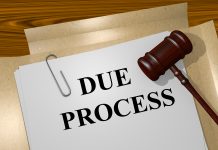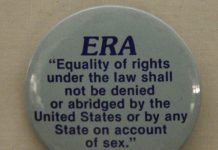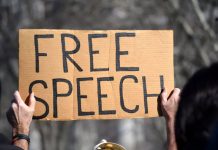In the digital age, everyone has the ability to have an opinion. Freedom of Speech is one of the most important pillars of the collection of rights we have as American citizens. Our first President George Washington declared that “if freedom of speech is taken away, then dumb and silent we may be led, like sheep to the slaughter.”
However, our Founding Fathers didn’t foresee Twitter, Facebook, online forums, and comment sections. What most people see as “Freedom of Speech” has really become the right to say stupid things whenever and wherever you want, which as a lawyer annoys me greatly. So let’s do a little rundown of what your First Amendment to Free Speech actually means, shall we?
1. It Only Applies To The Government
That’s right, the Constitution and all the Supreme Court clarifications only say that you have the right to articulate your opinions without fear of government censorship or retaliation. The founders included it in to prevent retaliation and imprisonment against people speaking out against the government, which was a common punishment in places like England at the time.
2. There Are So Many Exceptions To The Rule
Ever heard the phrase “you can’t yell fire in a crowded theater?” The Supreme Court has decided that if certain types of speech can create danger to the public, you don’t have the freedom to express it. Child pornography and defamation are two very prominent examples of this. The government can also make rules to control the time and manner of your freedom of speech for public safety. If there are city laws saying you can’t block a street to express your freedom of speech, then you have to adhere to those laws or be arrested.
3. Your Internet Stupidity Isn’t Covered
One of the most popular (and wrong) uses of “my freedom of speech is being violated” comes from keyboard warriors on social media, blog posts, message boards, and comment sections. You say something rude, stupid, racist, sexist, homophobic, and your comment gets deleted or you get banned from the website. Oh woe! My rights are being violated! Call the First Amendment police! Sorry, kids, that’s not how this works. All websites have their rules and guidelines for what is acceptable content for their site, and they have the absolute right to kick you out or shut you up if you violate that. More importantly, the First Amendment doesn’t protect you from the reaction of others to your “free speech.” If you say something that people disagree with, they have every right to react as they please to your statement. There is no constitutional right to not be offended, and no right to block responses to your stupidity.
4. You CAN Be Fired For Exercising Your Right To Be Stupid
Another popular outrage happens when someone gets fired for saying or doing something offensive, otherwise known as “hate speech.” If you work for a private company, they have every right to fire you if you contradict the message they want to put out to the spending universe. They can’t stop you from saying it, but they can certainly make sure you won’t say it while you’re associated with them.
5. Kneeling At Sporting Events Is Protected Speech
Even though so many “patriots” say it should be illegal for people like Colin Kaepernick to kneel during the national anthem at football games, it is considered by the Supreme Court to be symbolic speech (see Texas v. Johnson and Cohen v. California for examples) and is protected. That’s considered a political statement in itself, as you have the right to be silent just as much as the right to speak. So when your conservative uncle complains during the annual Thanksgiving football games, he has no legal leg to stand on.
6. Yes, Your Crazy Uncle Has The Right To Block You On Facebook
Or on Twitter, or Tumblr, or any other website that has user control. Sometimes when you block someone, they like to contact you via other means and accuse you of denying them their freedom of speech. Nope, that’s not how this works. Remember point number 1? Private users on websites like social media have every right to block you from their page, as long as its not against that site’s terms of use. And trolls beware, if you’re blocked from Facebook groups (say, a political Facebook group) and that makes you mad, sorry. You don’t control the space, and therefore have no right to demand that your opinions stay up if the powers that be tell you to move on. And beware, the second someone’s words become threatening or violent, you’re asking for police interaction.
7. Students Do Have Freedom Of Speech, But It Is Limited
You really have to consult the experts here, because there has been quite a few Supreme Court cases about where a student’s free speech ends. Thanks to Tinker v. DeMoines, student free speech is the law of the land. However, there are significant limitations. Subsequent case law clarified that the school can restrict speech if it disrupts the learning process (we’ve all heard that one before) or is contrary to the basic educational mission of the school. It’s also worth nothing that these principles only apply to public schools. Parochial and private schools can restrict student’s speech to a much higher degree. The internet has also provided significant new challenges for schools regarding free speech. Think social media and cyberbullying. Unfortunately, there are no clear answers here, the law is still evolving.

Photo courtesy of imgflip
Sarah Campbell is an attorney licensed to practice law in the state of Texas. She is a graduate of Texas A&M School of Law.
Feature image courtesy of memecrunch





